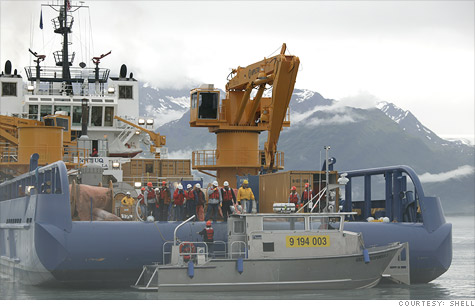Search News

Shell's new oil spill containment ship in an exercise off the Alaskan coast. Oil companies want to drill in Arctic waters, but environmentalists say they don't have enough safety equipment in place.
NEW YORK (CNNMoney) -- The House is set to streamline regulations around Arctic drilling this week that would speed the development of oil and gas reserves off the Alaskan coast over the objections of environmentalists.
At issue is a series of leases held by Royal Dutch Shell (RDSA), Conoco Phillips (COP, Fortune 500), Norway's Statoil and a handful of other companies in the Chuckchi and Beaufort Seas, which lie west and north of Alaska. The leases are outside Alaska's Arctic National Wildlife Refuge.
The areas have been open for drilling for years and the companies have paid billions of dollars to the federal government for the right to explore for oil and gas on them.
But gaining the final permits for drilling has been challenging as environmentalists have made it more difficult for drillers to secure the permits using procedural and legal tactics.
Supporters of the drilling argue that a significant amount of oil and jobs are at stake.
Debating arctic drilling safety: Environmentalists say the industry does not have the proper equipment in place to deal with a major oil spill in the Arctic, which would be far more challenging than the warm and accessible Gulf of Mexico.
Marilyn Heiman, Arctic program director for the Pew Environment Group, said she is not opposed to drilling in Arctic waters eventually, but that more equipment and better procedures need to be in place before the industry begins exploration, which it wants to do in 2012.
Specifically, she wants more deepwater ports built that can handle the large ships needed in case of an accident; a containment dome on standby similar to the one BP used to cap its runaway well in the Gulf last summer, and more airstrips and other infrastructure in place to respond to an emergency.
"The Arctic Ocean is one of the most dangerous places in the world to drill for oil, and we have species there that cannot be found anywhere else in the world," said Marilyn Heiman, Arctic program director for the Pew Environment Group. "This is too much, too soon, too fast."
Heiman cited a news report Monday which quoted the U.S. Coast Guard commandant as saying "there is nothing up there to operate from at present and we're really starting from ground zero."
But Shell said it has spent millions lining up the right equipment to handle an accident.
That equipment includes a state-of-the-art oil recovery ship specifically built for the Arctic ocean, as well as a series of smaller boats, boom, and an Arctic oil tanker and extra drill ship on lease that can be called upon in the event of a disaster.
"In the extremely unlikely event of a blowout or spill, Shell would be ready to respond within one hour," a spokeswoman for the company said in a statement.
The company also said it plans to have a capping device in place by the time it starts drilling.
Shell wants to drill 10 wells off the Alaskan coast in 2012, calling the pace something "that we would not propose if we weren't absolutely certain we could conduct these operations safely."
There are currently a small amount of wells producing off the Alaskan coast, but they are close to the shoreline. The new leases extend to nearly 200 miles from shore, although none of the proposed well sites are in deep water.
What slowed Alaska's off-shore drilling: Environmentalists have held up the new permits by saying they violate the Clean Air Act, as the drilling rigs and ships servicing them produce air pollution during operations.
The Environmentalists have appealed decisions by the Environmental Protection Agency to issue the permits to an oversight board within EPA -- the Environmental Appeals Board.
The House legislation removes the clean air issues around offshore drilling from the purview of that board, and relaxes the clean air standards the industry must meet.
"We can either safely produce American energy in Alaska and create thousands of jobs in the process," said a republican staffer on the House Energy and Commerce Committee, "or ignore this area's great energy potential and import oil via tanker from places where the environment is not a concern."
Supporters of the drilling say the areas could yield an extra 1 million barrels a day of oil production, create 54,000 American jobs and add $200 billion to government coffers over a 50 year time period.
The United States currently produces about 10 million barrels of oil per day, including natural gas liquids, biofuels, and other products that are all used to make gasoline. The world consumes about 88 million barrels a day.
The legislation is expected to pass the House this week. There is similar legislation in the Senate, although its fate there and whether the president will sign it into law is uncertain.
The administration was supportive of Arctic drilling in the past, but has taken a more cautious stance since the BP disaster. It's latest comment on the offshore Alaskan leases was that they are "under review." ![]()
| Overnight Avg Rate | Latest | Change | Last Week |
|---|---|---|---|
| 30 yr fixed | 3.80% | 3.88% | |
| 15 yr fixed | 3.20% | 3.23% | |
| 5/1 ARM | 3.84% | 3.88% | |
| 30 yr refi | 3.82% | 3.93% | |
| 15 yr refi | 3.20% | 3.23% |
Today's featured rates:
| Latest Report | Next Update |
|---|---|
| Home prices | Aug 28 |
| Consumer confidence | Aug 28 |
| GDP | Aug 29 |
| Manufacturing (ISM) | Sept 4 |
| Jobs | Sept 7 |
| Inflation (CPI) | Sept 14 |
| Retail sales | Sept 14 |